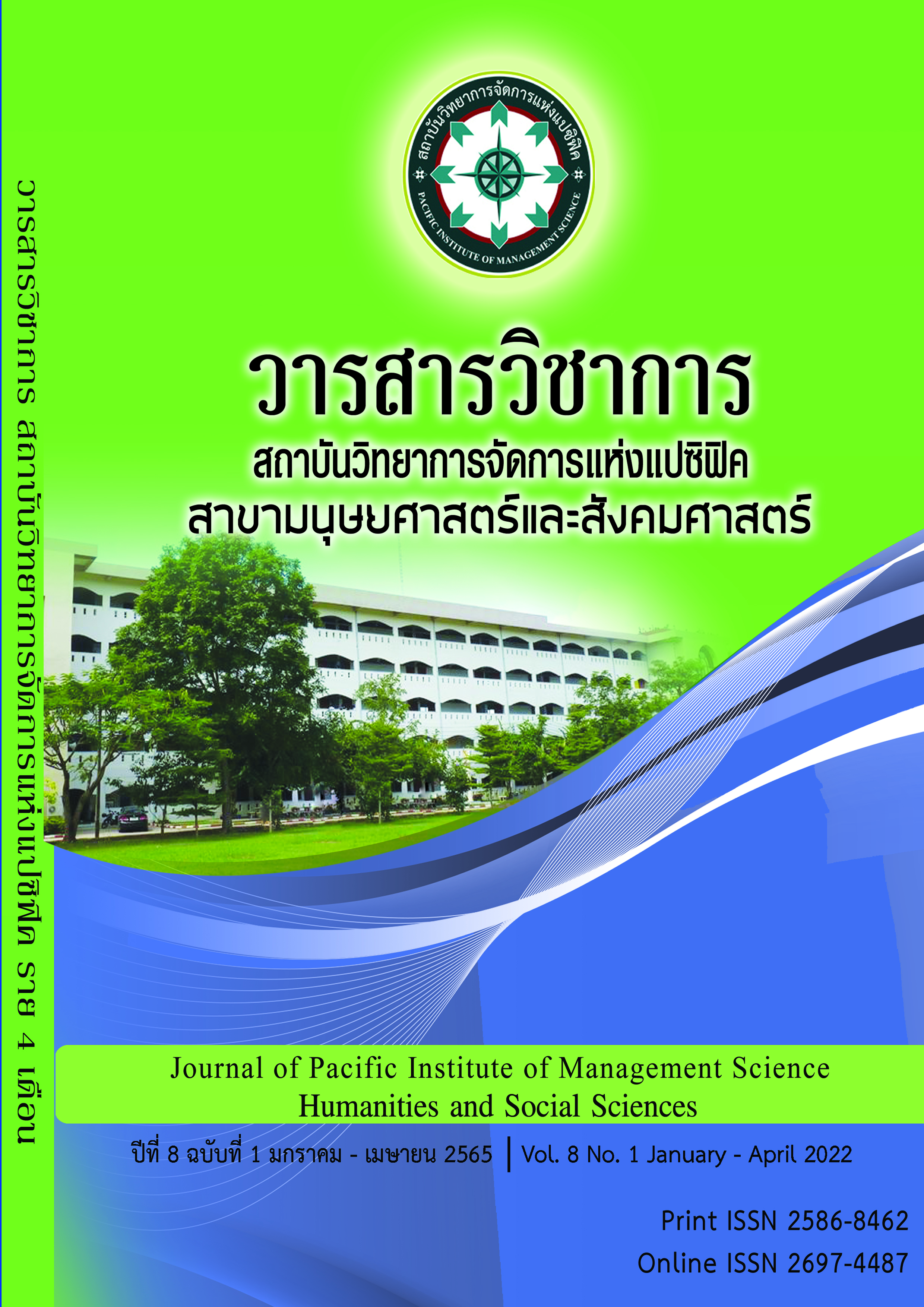The Result of Using Task-based Instructional Model with Social Media to Enhance Speaking Skills of Pre-Service Teacher, Chandrakasem Rajabhat University.
Keywords:
Instructional Model Using Task - Based Learning, Speaking Skills, Social MediaAbstract
The purposes of this research were to: 1) study the efficiency of the instructional model using task-based learning with online social media to enhance speaking skills of pre-service teachers 2) study the effectiveness of the instructional model using task-based learning with online social media by comparing Pretest and Posttest scores after using this model 3) study the levels of student satisfaction towards the developed teaching model. The sample was 60 third year Educational Technology and Computer students studying during the 2nd semester of the 2019 academic year. The instruments were the English speaking skills assessment test, development of speaking skills assessment form and questionnaire. The data were analyzed by mean, standard deviation, t-test dependent, t-test independent and content analysis.
The finding were as follows:
1. The instructional model using task-based learning with online social media to enhance speaking skills of pre-service teachers called “PACE Model” consisted of (1) Preparation: P (2) Action to the task: A (3) Checking student comprehension: C and (4) Evaluation of creative task: E The efficiency of the PACE Model met the criterion of 80.11 / 81.07
2. The effectiveness of the PACE Model indicated that 1) after using the PACE Model, the students’ levels of speaking ability were higher than before receiving the instruction at a .05 significance level.
3. The students’ satisfaction toward the instructional model using task-based learning with online social media was at a high level.
References
กุณฑลีย์ ไวทยะวณิช. (2545). หลักการพูด. กรุงเทพฯ: โอ. เอสพริ้นติ้ง เฮ้าส์.
ชัยยงค์ พรหมวงศ์. (2556). การทดสอบประสิทธิภาพสื่อหรือชุดการสอน Development Testing of Media and Instructional Package. วารสารศิลปากรศึกษาศาสตร์วิจัย, 5(1), 7-20.
ทิศนา แขมณี. (2555). บัณฑิตศึกษาในศตวรรษที่ 21: การปรับหลักสูตรและการสอน.
เอกสารอัดสำเนา.
นงสมร พงษ์พานิช. (2554).การศึกษาปัญหาของการพูดภาษาอังกฤษในการสื่อสารด้วยวาจาของนิสิตคณะวิทยาการจัดการ.มหาวิทยาลัยเกษตรศาสตร์วิทยาเขตศรีราชา. วารสารมนุษยศาสตร์, 18(1), 85-97.
นิรมล วรมัต. (2551).การพัฒนาการเรียนภาษาอังกฤษโดยใช้กิจกรรมการเรียนรู้แบบเน้นงานปฏิบัติ ของนักเรียนชั้นประถมศึกษาปีที่ 4. วิทยานิพนธ์ ศึกษาศาสตรมหาบัณฑิต สาขาการสอนภาษาอังกฤษ. บัณฑิตวิทยาลัย มหาวิทยาลัยราชภัฏอุดรธานี.
บุตรศิรินทร์ จิวพานิชย์. (2560). การพัฒนาการเรียนการสอนภาษาอังกฤษเรื่อง อาชีพ โดยใช้โปรแกรม Activin spire สำหรับนักเรียนประถมศึกษาปีที่ 1 โรงเรียนสาธิตมหาวิทยาลัยราชภัฏสวนสุนันทา. มหาวิทยาลัยราชภัฏสวนสุนันทา
ภัคพล หัสสา. (2553). การพัฒนาความสามารถในการพดูภาษาอังกฤษของนักเรียน ชั้นประถมศึกษาปีที่5 ที่เรียนโดยกลวิธีการชดเชยการสื่อสาร. (ปริญญานิพนธ์ศึกษาศาสตรมหาบัณฑิต สาขาวิชาการสอนภาษาอังกฤษ สำหรับผู้พูดภาษาอื่น, มหาวิยาลัยราชภัฏอุดรธานี.
ระวิ แก้วสุกใส และชัยรัตน์ จุสปาโต. (2556). เครื่อข่ายสังคออนไลน์ กรณี เฟซบุ๊ก กับการพัฒนาผู้เรียน. วารสารมหาวิทยาลัยนราธิวาสราชนครินทร์, (ฉบับพิเศษประจ าปี 2556), 195-203.
วิจารณ์ พานิช. (2555). วิถีสร้างการเรียนรู้เพื่อศิษย์ในศตวรรษที่ 21. กรุงเทพฯ: มูลนิธิสดศรี-สฤษดิ์วงศ์.
สุมิตรา อังวัฒนกุล. (2540). วิธีสอนภาษาอังกฤษ. กรุงเทพมหานคร : สํานักพิมพ์จุฬาลงกรณ์ มหาวิทยาลัย.
อัจฉรา วงศ์โสธร. (2539). แนวทางการสร้างข้อสอบภาษา. กรุงเทพฯ: จุฬาลงกรณ์มหาวิทยาลัย.
Bartz, W. H. (1979). Teaching Oral Communication in the Foreign Language Classroom. Language in Education Theory and Practice. Virginia : The Centre for Applied Linguistics, 81 – 82.
Breen, M.P. (1987). Learner contribution to task design. In Language learning tasks, 28-46. U.K.: Prentice-Hall International Ltd and Lancaster University.
Byrne. D. (1986), Teaching Oral English. Singapore: Longman Ltd.
Canale M. and Swain M. (1980). Theoretical Base of Communicative Approaches to Second Language Teaching and Testing. Retrieved December 1, 2007.
Candlin, C.N. (1987). The communicative teaching of English: Principles and exercise typology. London: Longman Group Co.
Ellis R. (2004). Task-based language Learning and Teaching. Oxford: Oxford University Press.
Hammer, J. (2003). The Practice of English Language Teaching. 6th edition. New York: Longman.
Hosseiny, M. (2014). The role of direct and indirect written corrective feedback in improving Iranian EFL students’ writing skill. Procedia Social and Behavioral Sciences, 98, 668-674.
Jack C. Richards. (2006). Communicative Language Teaching Today. Cambridge University Press.
Johnson, D. W., and Johnson, R. (1999). Learning together and alone: Cooperative, competitive, and individualistic learning (5th Edition). Boston: Allyn & Bacon. First edition 1975.
Joyce, B.and Weil, M. (2000). Model of teaching. London: Prentice-Hall.
Larsen - Freeman, D. (2002). Techniques and Principles in Language Teaching. Cambridge: Cambridge University Press.
McCombs, B. L. (2000). Assessing the role of educational technology in the teaching and learning process: A Learner-centered perspective. Paper presented at the meeting of the Secretary’s Conference on Educational Technology: Measuring the Impacts and Shaping the Future.
Washington, D. C.
Nunan, D. (1989). Second language teaching and learning. New York: Heinle and Heinle.
Oppenheimer, R. J. (2001). Increasing student motivation and facilitating learning. College Teaching, 49(3), 96-98.
Prabhu, N. S. (1987). Second Language Pedagogy. Oxford: Oxford University Press.
Prapphal, K. (2001). English proficiency of Thai learners and directions of English teaching in Thailand. Journal of English Studies, 1(1), 6-12.
Raymond, E. (2000). Cognitive Characteristics: Learning with Mild Disabilities. Needham Heights, MA: Allyn & Bacon.
Richards, J.C. (2006). Communicative Language Teaching Today. Cambridge: Cambridge University Press.
Richards, J. C. and Rodgers, T. (1986). Approaches and Methods in Language Teaching. Cambridge: Cambridge University Press.
Sarkis, R. (2012). Using Cognitive Strategies to Improve English Speaking Skill and Self-confidence. American Journal of Education Sciences, 2(4), 19-23
Skehan, P. (1996). A Framework for implementation of task-based instruction. A lied Linguistics, 17, 38-62.
Tribolet, C. (2012). Using cognitive strategies to improve English speaking skill and self-confidence. American Journal of Education Science. 2(3), 36-40.
Vygotsky, L. (1978). Mind in society: the developmental of higher psychological process. Cambridge, MA: Harvard University Press.
Willis, J. (1996). A framework for task-based learning. Harlow: Longman
Downloads
Published
Issue
Section
License
Copyright (c) 2022 Pacific Institute of Management Science

This work is licensed under a Creative Commons Attribution-NonCommercial-NoDerivatives 4.0 International License.
บทความที่ได้รับการตีพิมพ์เป็นลิขสิทธิ์ของ สถาบันวิทยาการจัดการแห่งแปซิฟิค
ข้อความที่ปรากฏในบทความแต่ละเรื่องในวารสารวิชาการเล่มนี้เป็นความคิดเห็นส่วนตัวของผู้เขียนแต่ละท่านไม่เกี่ยวข้องกับสถาบันวิทยาการจัดการแห่งแปซิฟิค และคณาจารย์ท่านอื่นๆในสถาบันฯ แต่อย่างใด ความรับผิดชอบองค์ประกอบทั้งหมดของบทความแต่ละเรื่องเป็นของผู้เขียนแต่ละท่าน หากมีความผิดพลาดใดๆ ผู้เขียนแต่ละท่านจะรับผิดชอบบทความของตนเองแต่ผู้เดียว







